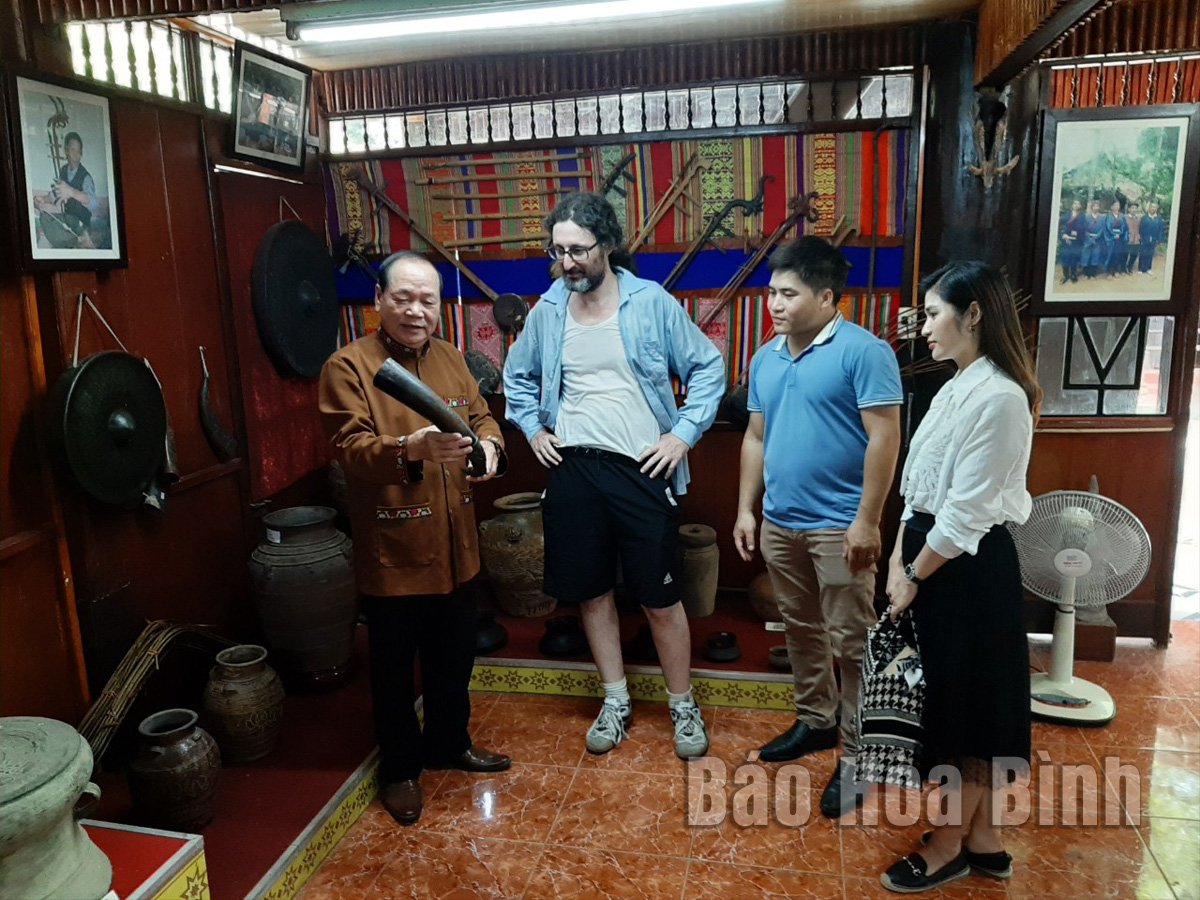
(HBO) – Bui Thanh Binh, Director of the Muong Cultural Heritage Museum in Thai Binh ward of Hoa Binh city (Hoa Binh province), has been spending decades helping preserve the Muong ethnic group’s culture.
Bui Thanh Binh introducing tools displayed at the Muong Cultural Heritage
Museum in Thai Binh ward of Hoa Binh city to visitors.
Binh said when working as a tour guide at the
Hoa Binh travel company in 1985, he realised that foreign tourists preferred
visiting mountainous and remote areas to explore ethnic groups’ culture. Born
in the Muong Dong area – one of the cradles of the Muong culture, he has
nurtured a desire to help uphold the cultural heritage of the Muong people
since their culture not only is diverse but also boasts high artistic value.
In 1985 - the first year of his efforts, Binh
spent his modest salary collecting household utensils such as a basin, a frying
pan, and several bronze food trays from rural residents. From 1988 to 1998, he
collected a number of ceramic and bronze items, rice milling utensils, and
belongings of shamans. About 5,000 - 6,000 unique objects reflecting the life
of Muong people have come to his possession so far.
Introducing the Muong Cultural Heritage Museum,
Binh showed visitors six stilt houses deeply imbued with Muong people’s
cultural identity. The houses are located on a hill covering about 4,000 square
metres.
Among them, a stilt house of a Muong herbalist
contains many precious objects like an altar, a set of items used in betel
chewing, jewellery, hunting and foraging tools, bone and horn handicrafts,
swords, and seals. Meanwhile, the farmer house boasts such items as rice
milling utensils, wine jars, a wooden weaving loom, and men and women’s
outfits, helping visits gain an insight into the life of Muong people.
At a stilt house showing the ethnic group’s
cuisine, Binh said wild vegetable, five-colour steamed sticky rice, grilled and
steamed fish, and roasted pork are among the dishes winning tourists’ hearts.
Over the last more than 10 years, the Muong
Cultural Heritage Museum has welcomed thousands of tourists from across Vietnam
and other countries.
Apart from searching for and collecting
antiquities of the Muong culture, Binh has also invested efforts in maintaining
and popularising the group’s folk songs, especially gong pieces – a
long-standing part of the Muong people’s life.
The artisan has taught the Muong gong playing
skills and folk music to learners from various localities, from Hoa Binh,
Hanoi, Phu Tho, Thanh Hoa in the north to Lam Dong and Dak Lak provinces in the
Central Highlands. He is also the head of the Muong village’s artisan group at
the Vietnam National Village for Ethnic Culture and Tourism in Hanoi’s Son Tay
town./.
The People’s Committee of Lac Son district held a ceremony on April 28 to receive the provincial relic certificate for the ancient rock carving site at Suoi Co stream, located in My Thanh commune.
A special music show titled "The country is in the fullness of joy” has been held at Hoa Binh Square in Hoa Binh city in celebration of the 50th anniversary of the liberation of the South and national reunification (April 30, 1975–2025).
The People's Committee of Lo Son commune, Tan Lac district, has organised the local annual traditional stream fishing festival on April 19 - 20.
As a land deeply intertwined with human history and Vietnam’s millennia-long journey of nation-building and defence, Hoa Binh is often revered for its epic tales and legends.
Residents of Hoa Binh boast a rich cultural identity, reflected in their unique language, traditional attire, customs, and folk melodies – described as "sweet as honey, clear as a mountain stream.”
Lac Son district’s Vu ban town held the 2025 Truong Kha temple festival on April 12–13 (the 15th–16th days of the third lunar month). Since its revival in 2019, the festival has been organised every three years, preserving valuable intangible heritage while meeting the community’s cultural and spiritual needs.



